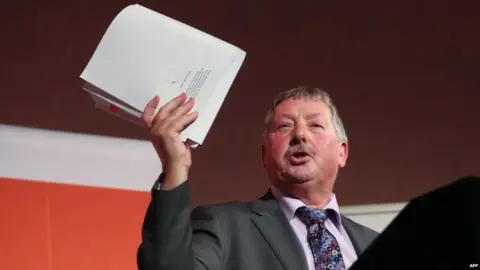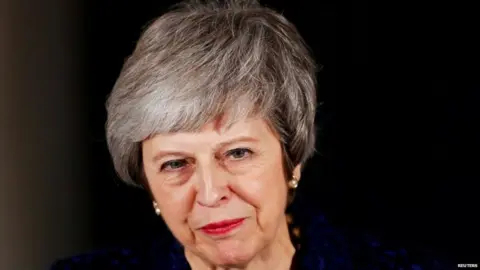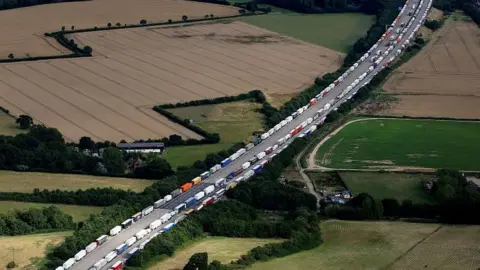Brexit: The DUP says there is 'no way' it will back PM's deal
 AFP
AFPThere is "no way" the Democratic Unionist Party will back Theresa May's Brexit deal, a leading figure has said.
Sammy Wilson told the BBC he was "more alarmed" than ever about what the deal would mean for Northern Ireland.
The DUP, which props up Theresa May's government, has held talks with the PM in recent days as she tries to persuade MPs to back the deal later this month.
The PM is seeking further legal assurances from the EU but it has said negotiations will not be re-opened.
The UK is due to leave the EU on 29 March 2019.
MPs will decide whether to accept or reject the withdrawal terms negotiated by Mrs May, as well as the framework of future relations, in a vote expected on 15 January.
The vote was due to be held in December but Mrs May postponed it after it became clear she would be heavily defeated.
In the three weeks since then, she has been appealing to EU leaders to do more to allay MPs' concerns over parts of the agreement, particularly the proposed Irish backstop.
This arrangement would see the UK remain closely aligned to EU rules if the two sides' future relationship is not settled by the end of 2020, when the proposed transition period will end, or if another way is not found of preventing physical checks on the border between Northern Ireland and the Republic of Ireland.
 Reuters
ReutersMrs May, who had a "friendly phone call" with European Commission President Jean-Claude Juncker on Friday, insists it is a contingency plan that all sides agree should not be needed.
But the DUP are adamantly opposed, saying it will create new barriers between Northern Ireland and the rest of the UK and could end up as the default template for future relations.
Mr Wilson, the DUP's Brexit spokesman, told BBC Radio 4's Today programme that little had changed since mid-December and his party believed the backstop was a "con trick" that was being imposed on the UK.
Asked if there was any way the party could support the PM's deal, he replied "no there is not".
"It is not just because of the regulations which Northern Ireland would be subject to with the backstop, but also the fact we would have to treat the rest of the UK as a third country and we would not participate in any trade deals which the UK may enter into the future".
Irish 'red lines'
On Thursday, Irish Prime Minister Leo Varadkar said the border issue was the only "red line" his country has had in the Brexit negotiations and that would not change.
While he and other EU leaders were prepared to offer assurances and clarifications to help Mrs May get the agreement through Parliament, he said it has "to be a proposal that we can accept".
"It can't be a proposal that contradicts what is already in the withdrawal agreement," he said. "It can't be something that renders the backstop inoperable, for example."
The DUP have said talk of the return of a hard border on the island of Ireland is "nonsense propaganda", since neither London nor Dublin wants it or is willing to construct the infrastructure.
The BBC understands that up to 40 Conservative MPs are likely to vote against the Brexit agreement even if Mrs May secures further concessions on the backstop.
This would mean almost certain defeat for Mrs May, since Labour, the Lib Dems and the SNP have all vowed to vote against the deal.
Many Tory members of the European Research Group remain opposed to the UK handing over £39bn, as part of the proposed financial settlement, in return for what they say are vague promises over future trading terms and would prefer the UK to leave without a deal.
No-deal preparations
 PA
PAMeanwhile, preparations for a possible no-deal exit are being stepped up in a number of areas.
A plan to keep traffic moving around Kent and to minimise disruption and delays at Channel ports is to be tested in the coming days.
More than 100 HGVs will be parked at the disused Manston airport near Ramsgate and then driven the 20 miles down the A256 to the Port of Dover.
The Department for Transport said the manoeuvres, part of Operation Brock, were being carried out so that if they "need to be implemented, the system is fully functional".
And a new government website advising the public and business on how to prepare will be launched on Tuesday.
The Department for Exiting the European Union said the site, which will be available through the gov.uk portal, will contain "some new information".
There will be sections devoted to European nationals living in the UK and British expats living on the Continent.
A spokesman said there would be "advice" on what people need to do in the event of the UK leaving without a deal. The website will also cover other scenarios, including if the UK leaves on the basis of Mrs May's agreement.
Analysis: Can May unblock her deal?
The BBC's political correspondent Iain Watson
When Theresa May pulled the "meaningful vote" on Brexit last month, the day before MPs were about to pass their verdict on her deal, Downing Street hoped two things would happen.
First, that the EU would offer some form of legal guarantee that the Northern Irish backstop - the arrangements for avoiding a hard border on the island of Ireland - would be temporary.
This, in turn, would bring the DUP on board - and unlock further support from previously hostile Conservative backbenchers.
Second, that some sceptical MPs, once away from the febrile atmosphere at Westminster, would quietly reflect over Christmas that the deal wasn't as bad as all that, as it at least guarantees that the UK will leave the EU at the end of March.
So perhaps any rebellion would diminish, if not evaporate.
But neither hope has - yet - been realised, with the vote now less than two weeks away.
